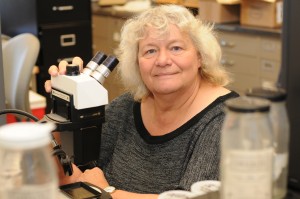Thomas’s Paper Published in Nature Geoscience

Ellen Thomas, research professor of earth and environmental sciences, is the co-author of a paper titled “Carbon Sequestration during the Palaeocene–Eocene Thermal Maximum by an Efficient Biological Pump,” published in the April 2014 edition of Nature Geoscience.
In the paper, Thomas explains how ocean-dwelling bacteria may have vacuumed up carbon and halted a period of extreme warmth some 56 million years ago. The finding suggests how Earth might once have rapidly reversed a runaway greenhouse effect.
Its effect on global oceanic productivity is controversial. In the paper, Thomas and her colleagues present records of marine barite accumulation rates that show distinct peaks during this time interval, suggesting a general increase in export productivity. The authors propose that changes in marine ecosystems, resulting from high atmospheric partial pressure of CO2 and ocean acidification, led to enhanced carbon export from the photic zone to depth, thereby increasing the efficiency of the biological pump. Higher seawater temperatures at that time increased bacterial activity and organic matter regeneration.
Gabriel Popkin ’03 wrote about Thomas’s research in a April 2014 article titled “Ocean Bacteria May Have Shut Off Ancient Global Warming” in Science News.

